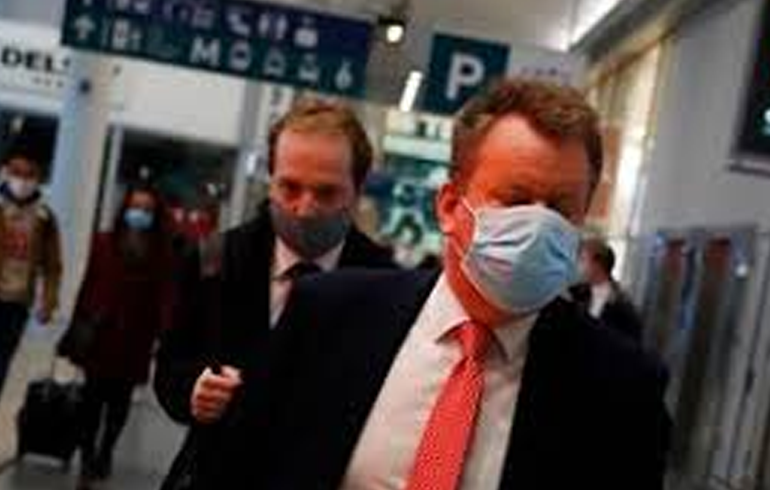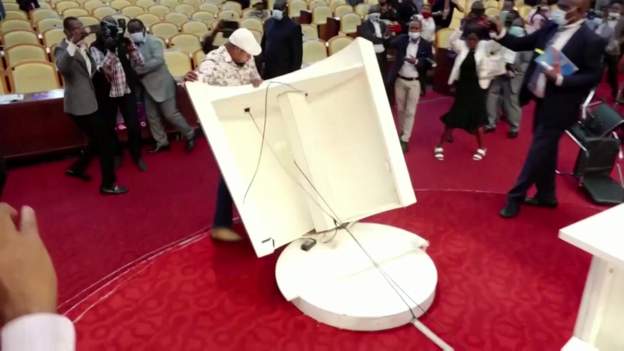The UK and EU have reached agreement on post-Brexit border checks and trading rules for Northern Ireland.
The UK had planned to override parts of the Brexit divorce deal it signed last year, potentially breaking international law.
It said it wanted a “safety net” to prevent a “border down the Irish Sea” in case talks with the EU over the border broke down.
But the UK has now dropped plans to put the powers into law.
The threat had risked jeopardising a separate negotiations over a UK-EU trade deal, which are heading into a crucial stage.
The UK government has pledged to remove controversial sections in its Internal Market Bill, as well as similar parts of a forthcoming bill about taxation, after reaching an “agreement in principle” with the EU.
Ministers had admitted the sections would have allowed them to breach international law, and led the EU to threaten a legal challenge over them.
The details of the new borders agreements have not yet been published, but are expected to be rubber stamped before the end of the month.
They will apply regardless of whether the two sides agree a deal to govern their trading relationship after the Brexit transition period ends on 31 December.
The agreement follows talks in Brussels between Cabinet Office Minister Michael Gove and EU commissioner Maroš Šefčovič, which have taken place alongside the negotiations over a free trade agreement.
Speaking after the announcement, Mr Gove said he was “delighted” and thanked the EU team for their “constructive and pragmatic approach”.
Mr Šefčovič said the agreement had removed “one big obstacle” from the trade talks, and would create “positive momentum” for the negotiators.
Speaking to reporters in Brussels, he added that the negotiating teams are “still very far apart, and we are not hiding this from anyone”.
Welcoming the news, Irish Foreign Affairs Minister Simon Coveney told RTE News the new border deal was a “very important positive for the island of Ireland”.
“It’s hopefully a signal that the British government is in a deal-making mood and we can carry some momentum from this,” he added.
Brexit – The basics
Brexit happened but rules didn’t change at once: The UK left the European Union on 31 January 2020, but leaders needed time to negotiate a deal for life afterwards – they got 11 months.
Talks are happening: The UK and the EU have until 31 December 2020 to agree a trade deal as well as other things, such as fishing rights.
If there is no deal: Border checks and taxes will be introduced for goods travelling between the UK and the EU. But deal or no deal, we will still see changes.
The Brexit withdrawal agreement – or divorce deal – sets out the details of the UK’s exit from the EU, which took place earlier this year.
Northern Ireland is the only land border between the UK and the EU.
Under an arrangement known as the Northern Ireland protocol – which is part of the withdrawal agreement – from January, goods will not need to be checked along the Irish border and the region will continue to enforce the EU’s customs product standards rules.
This means, in order to comply with EU requirements, some checks will be needed on certain goods entering Northern Ireland from Great Britain (England, Scotland and Wales).
In September, the EU expressed anger when the UK government published its Internal Market Bill, which would have enabled ministers to ignore some of the Northern Ireland protocol requirements.
For example, it would have allowed ministers to override sections of the Brexit divorce deal specifying that companies moving goods from Northern Ireland to Great Britain would have to fill out export declaration forms.
The pledge from ministers to remove the powers comes just one day after they ordered Conservative MPs to reinstate them to the bill on Monday. They had been removed from the bill by the House of Lords.
This is a Brexit breakthrough.
But not on those three sticking points we’ve heard so much about in the last few days: fishing rights, competition rules and enforcing any agreement.
You may remember all of the rows over the last few years about the border on the island of Ireland: how do you keep it open, with Northern Ireland outside of the European Union, and the Republic within it?
That is what this is about: working out mutually acceptable rules that will keep Northern Ireland more closely aligned to the EU than the rest of the UK.
What has happened today is a necessary, but far from sufficient, step as the two sides attempt to reach a free trade deal.
But one thing it unquestionably does is improve relations between the two sides – with the UK no longer threatening to breach the last deal it did with Brussels, the withdrawal agreement, at just the point it’s trying to sort out the next one.
Meanwhile, efforts to reach a UK-EU trade deal remain stalled over disagreements on fishing rights, business competition rules and how any deal would be enforced.
Boris Johnson – who is due to travel to Brussels this week in a bid to break the deadlock – has described the situation as “very tricky” but added that “hope springs eternal”.
Speaking on Tuesday, Germany’s Europe Minister Michael Roth said “fundamental disagreements” remained in key areas.
“We want an agreement, but not at any price,” he added.
How have UK politicians reacted?
Labour, which had opposed the sections of the Internal Market Bill that are now being withdrawn, said the announcement was a “welcome step forward, after months of crippling uncertainty for Northern Ireland”.
The party’s shadow Northern Ireland secretary Louise Haigh added the government would need to “work flat out” to ensure businesses are ready for the new arrangements.
Liberal Democrat leader Sir Ed Davey accused ministers of “spectacularly back-pedalling,” having “wasted months threatening to break international law”.
Northern Ireland’s First Minister Arlene Foster said her Democrat Unionist Party would await details of the new agreement before passing judgement.
She added it was important any new arrangements ensure Northern Irish businesses can trade freely with firms in Great Britain.
Source: BBC




















































